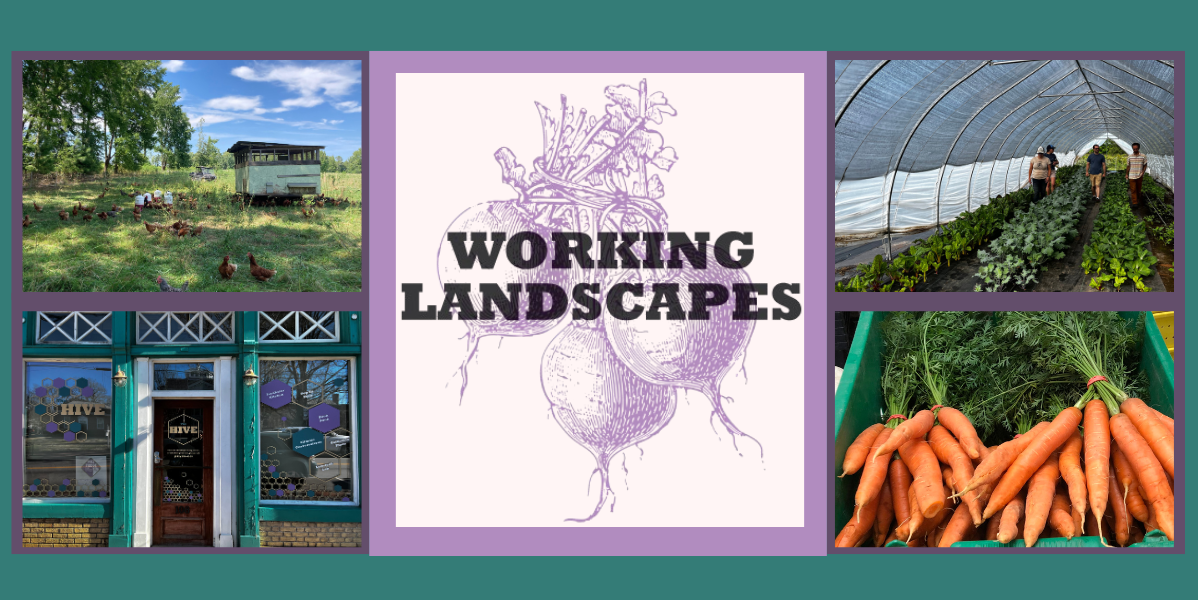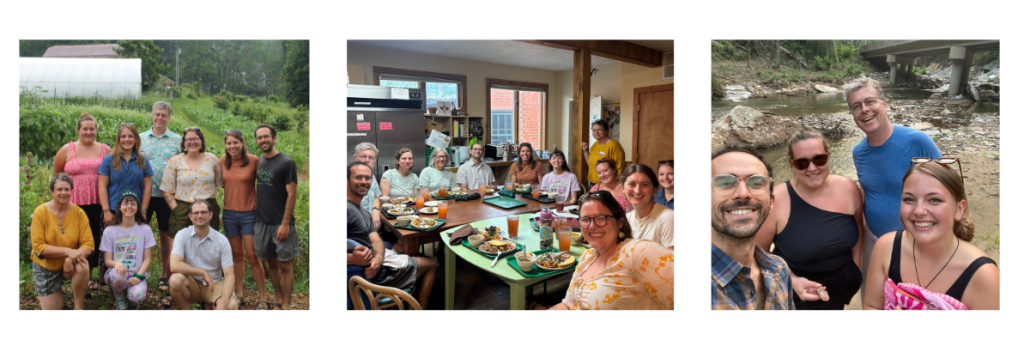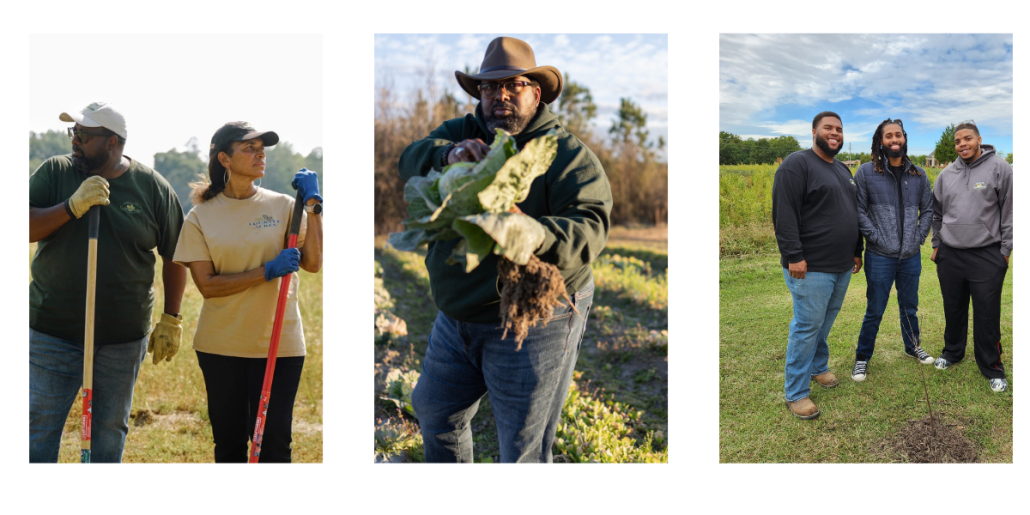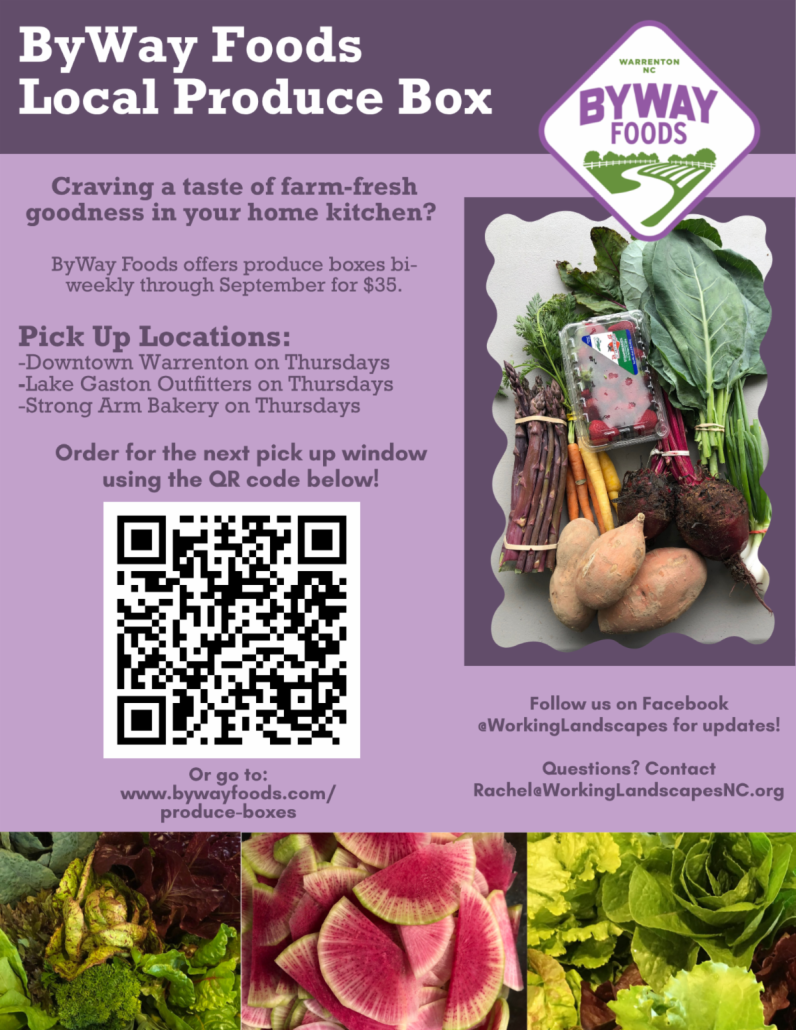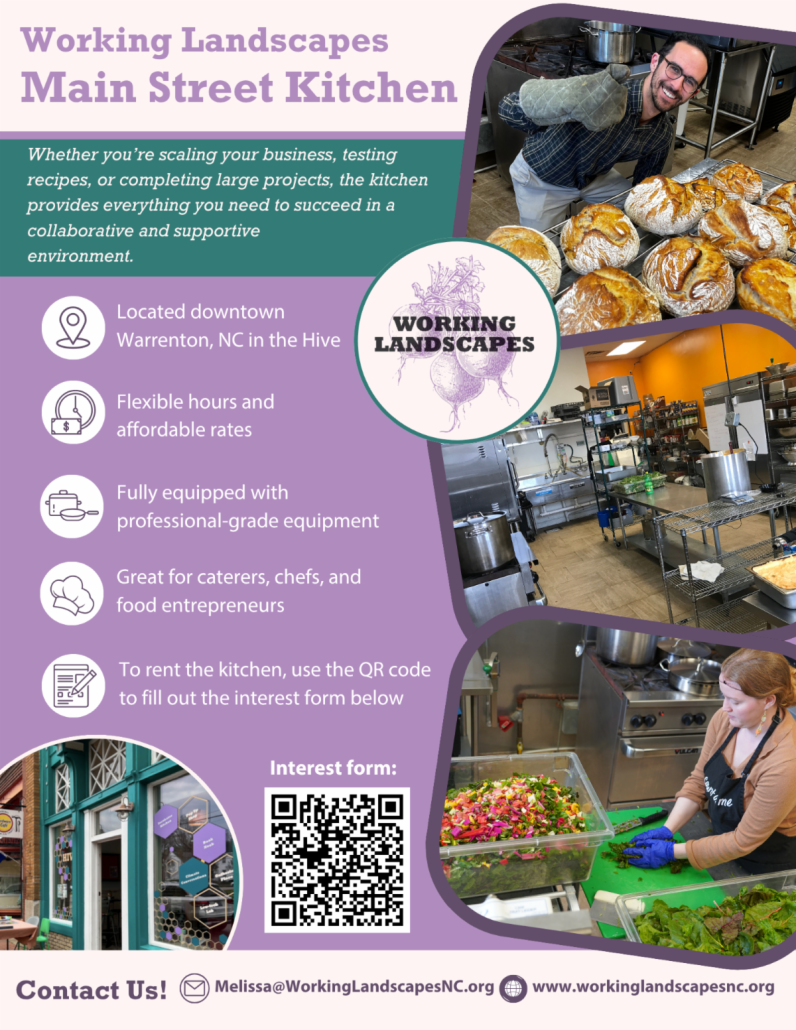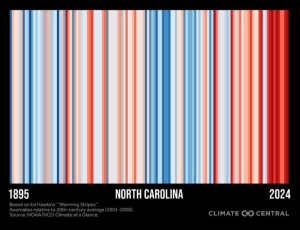
“Climate Stripes” of North Carolina from 1895 – 2024. Each stripe represents the average temperature of a year relative to a long-term average. Red stripes show years where the temperature was warmer than the long-term average; blue shows years where it was colder.
As a lifelong resident of NC, I know that July has always been hot. But this heat is different: a warmer atmosphere brings more moisture, more humidity, “feels like” temperatures in the triple digits. The rain is different, too–more, harder. I see it here at home, but am also aware of nearly daily news coverage of extreme weather events causing suffering and disruption.
If you are interested in learning more about all the ways that human-induced climate change is affecting our world, I highly recommend checking out Emergency on Planet Earth, a rigorously researched guide produced by Extinction Rebellion. I absolutely believe that understanding the state of our predicament is key to feeling empowered to act. (If you check out the guide above and want to talk about anything, I am happy to personally discuss it with you or connect you to resources.)
As someone who earned a PhD in Ecology and who is a believer in facts, I find the dismantling of the scientific apparatus and purging of data regarding weather, climate, pollutants and more to be deeply disturbing. I don’t have any quick and easy answers to this fundamental threat to informed decision making, but I want to at least point out that I think this is terrible.
To bring it back down to the local scale for a minute, we know that agriculture is both a huge contributor to the climate crisis (the podcast Animal Agriculture Exceptionalism on Planet Critical provides a great perspective), and also a source of many of the most accessible, scalable solutions.
Supporting local and regional food supply chains is one of the easiest things we can do to help shift energy towards climate solutions, as opposed to climate denial. Especially when paired with farming practices that promote soil health, food production in our region, for our region, just makes sense. When you buy local produce and pasture raised meats, you are supporting a stronger, more resilient food system, and helping to move carbon from the atmosphere into the soil.
If you haven’t signed up for our locally sourced produce box yet, click here for how you can enjoy delicious, seasonal produce while taking a tangible step towards climate solutions. You’ll also be stitching together a stronger community network, so we can be more ready to help each other when (not if) disruptions come our way. Thanks for your support of Working Landscapes.
This month, we are highlighting Jenni Rogan, our Director of Operations. Jenni started with Working Landscapes as a Climate Justice intern in 2022, then transitioned into a full-time position as a Climate and Community Coordinator before being promoted to Director of Operations in 2024.
Jenni first connected with Working Landscapes through her professor (Bev Wilson, who is a member of our Board) while attending the University of Virginia. Jenni’s professor is Carla’s childhood friend, so he made the connection. Carla’s passion for the food system and climate work intrigued Jenni because of her love for the natural world, cooking, and food.
In college, Jenni realized that climate solutions require people, so this shifted her academic and professional interests towards policy and planning work. She is thrilled to have landed at Working Landscapes because of the holistic approach to the interconnectedness of community development, food insecurity and housing affordability.
In her current position, Jenni manages several staff members, so her work day may include check-ins with staff about various topics, including food hub equipment issues, farmer services programming, and strategizing on grant writing. Jenni also manages the finances and leads the Resilient Communities programming.
Jenni’s favorite part of her job is helping co-workers solve problems, develop work plans, and get together with community partners to discuss big-picture ideas about possible climate solutions. Her favorite local food is heirloom tomatoes, which she finds best eaten on fresh sourdough bread with Duke’s mayonnaise.
|
All nine members of our main office staff traveled to Western North Carolina in early July. Over the course of three days, we had the opportunity to tour the High Country Food Hub in Boone and TRACTOR Food and Farms in Spruce Pine. We explored their facilities and spent time chatting with their staff about their various programs, and we were thoroughly impressed by the work they are doing!
We also visited Laughing Springs Farm in Boone, where we learned about their regenerative farming practices and saw the diverse range of vegetables, fruits, herbs, and flowers they grow.
In addition to our field trips, we held several retreat sessions to work on goals, address challenging projects, and make plans for the future. The retreat was a wonderful opportunity for the staff to collaborate and bond while hiking and swimming in the mountains.
This month, we want to highlight one of our farm partners, Fourtee Acres. Fourtee Acres is a 45-acre minority-owned family farm in Halifax County that utilizes natural garden practices. The farm is run by Tyrone and Edna Williams, alongside their sons Tyron, Trevelyn, and Tremaine. It was established in 1994 as part of the 195-acre century-old Williams Family farm.
Fourtee Acres has established goals around measured succession planning, generating sustainable wealth and income, conservation, and providing naturally grown produce for themselves, their community, and beyond. They strive to leave things better than they found them, and to work towards educating others by opening their farm as a training site and hosting workshops with other partners. Fourtee Acres provides vegetables for our Produce Box program, as well as other food hub programs.
We are also excited to welcome Tyrone to the Working Landscapes board! Tyrone’s interest in joining the Working Landscapes board of directors stems from his deep alignment with the organization’s mission and his personal experiences as a multi-generational landowner committed to sustainable practices and community empowerment. In essence, Tyrone’s decision to join the board of Working Landscapes is driven by his personal history, his proven dedication to sustainable practices, his desire to empower other landowners, and his alignment with the organization’s core values of community development and environmental stewardship.
Are you interested in getting more involved with Working Landscapes? We are looking for a few more board members to round out our board! We want to prioritize community members who live in the Warrenton region, but we are open to board members who will participate remotely, too.
To learn more and fill out our interest form, click here.
Are you interested in purchasing a bi-weekly produce? Keep a look out for our Produce Box newsletter with more details! We will have produce boxes available every other Friday in downtown Warrenton until the end of September. Produce Boxes can be ordered here.
We are proud to provide a fully-equipped, commercial-grade shared-use kitchen in the Hive, located in downtown Warrenton. Whether you’re launching a new business, perfecting a recipe, or completing a one-time project, our kitchen is designed to help you succeed. From state-of-the-art tools to ample workspace, The Hive’s kitchen offers everything you need to turn your culinary ideas into reality. To learn about the space and how to sign up to use the space click here.
Our new t-shirts are here! If you would like to purchase a t-shirt, please reply to this email and share what size you would like. The shirts are $20 and will be available for pick-up downtown Warrenton.
Are you a farmer or landowner interested in making biochar? Rent a kiln! We have two kilns available for rent for farmers and landowners. The Ring of Fire Kiln (shown in the flyer above) is best for larger amounts of debris, while the Oregon kiln is best for smaller amounts. Kilns will be available for pick-up at our food hub in Warrenton. We can also provide you with resources that share best practices for making biochar and applying it to your fields. To rent a kiln, please fill our the interest form here or email Jason@workinglandscapesnc.org for more information.
First Friday Poetry Night
Join the Warren Artist Market on First Fridays to hear local poets, storytellers, artists, and musicians! This event happens every first Friday of the month from 7-9:30p.m in the Hive.
Thanks for reading! We send monthly newsletters on what’s happening at Working Landscapes. If you know anyone who might be interested in our work, please forward this newsletter and encourage them to subscribe. If you no longer wish to receive updates, use the unsubscribe link below.

